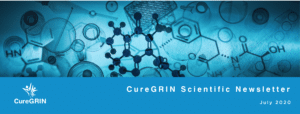Research in mice suggests that adults can overcome developmental deficits caused by GRIN Disorder.
Share This Post
Researchers at the University of Toronto tested whether repairing a Grin1 mutation in mice can restore cognitive function. In the article, “Consequences of NMDA receptor deficiency can be rescued in the adult brain”, they report that adult mice born without functioning NMDA receptors (NMDARs) recovered cognitive ability with gene editing.
Disease-causing variants in GRIN genes cause neurodevelopmental symptoms in children, such as developmental delay and intellectual disability. This is because the variants in GRIN genes produce NMDA receptors that do not function properly. NMDARs are important because of the central role they play in the development and functioning of the brain. (For more information about NMDARs and their significance to GRIN disorders, check out our recent blog post.)
Because NMDARs are so important for development, it was unknown whether developmental consequences of NMDAR deficiency could be reversed, and if so, in what time period such treatment had to occur. The Toronto research team wanted to answer the following question. Could someone born with dysfunctional NMDA receptors recover cognitive ability with treatment as adults?
Dr. Amy Ramsey, a member of the CureGRIN Scientific Advisory Board, and her colleagues tested this question on mice. First, they took mice that were born with a GRIN1 mutation and low NMDAR levels. Once the mice developed to adulthood, they restored the mutated GRIN1 gene to its normal configuration using an inducible gene editing[CAM3] technique that is uniquely available in mice. These mice were called GRIN1-rescue mice. The approach substantially increased the levels of NMDARs, although there was some variation in the extent of recovery in different brain regions.
The important question was how GRIN1 rescue mice would perform in a series of cognitive tests. For example, they tested their executive function in a puzzle box task, where the mice had to problem solve in order to reach a goal. In another task, their quality of social relationship was measured, by measuring how long a mouse investigated a novel mouse that they had not seen before. Mice with a decrease in GRIN1 expression that show GRIN disorder symptoms had trouble performing these tasks. Would the Grin1-rescue mice also show impairment in these tasks, or would they show a recovery of cognitive functioning?
In several of the cognitive assessments, the GRIN1-rescue mice performed comparably to the group born with a normal level of GRIN1 gene expression.
These results have important implications for a few reasons. First, the study suggests that it is possible to reverse the developmental consequences of changes in NMDA receptor expression levels, leading to changes in brain wiring. Mice that underwent development with an NMDAR deficiency, but where expression was rescued, performed well on tasks compared to unrescued mice, whose performance was impaired. Second, the study suggests that the reversal of developmental consequences can happen in adulthood. This is significant because it suggests that there is not a finite therapeutic time window where treatment must occur in order to rescue cognitive impairment.
It was previously thought that intervention must occur early in development before the brain becomes adult and unable to change. However, because even adults were able to show cognitive recovery following genetic intervention, it suggests that the adult brain is a lot more plastic than was thought. Plasticity in the brain refers to the brain’s ability to reorganize and adapt. It is now thought that the period in which the brain can change may extend well into adulthood.
The notable finding of this study is that cognitive functioning was restored in mice that had expressed less NMDARs, and therefore, presented with developmental consequences. This restoration occurred following a type of genetic intervention that is only possible in mice. In humans, genetic editing and gene therapy is not currently an option. It is also important to keep in mind that the research was done in mice and the mouse and human brain are similar, but have important differences. With that being said, research may lead to gene therapies and other drugs in the future that are able to restore the function of NMDA receptors. The results of this research indicate that it might be possible in the future to improve brain functioning, even in adult GRIN patients.
Dr. Amy Ramsey and Dr. Catharine Mielnik, two researchers involved in this study, hope that this provides families with some hope for the future as researchers continue to learn more about GRIN disorders and potential therapies. To hear more about their research and what it means for GRIN families, check out the short interview above, where Meagan Collins, CureGRIN’s Research Coordinator, sat down with Drs. Ramsey and Mielnik.
Read more Posts

Cure GRIN Scientific Newsletter – July 2020
Every two months, we’ll be sharing updates on the latest publications about GRIN genes, NMDA receptors and other glutamate receptors.

CFERV Conference on GRIN Variants Sept 2019
The 2019 conference brought together leading GRIN researchers from around the world and learn more about their latest discoveries.

